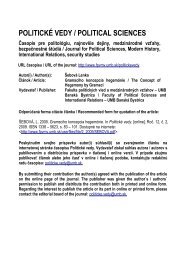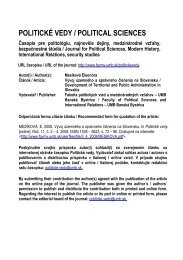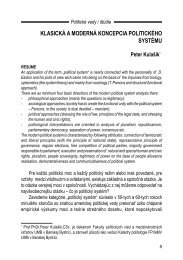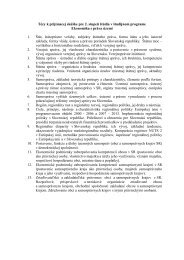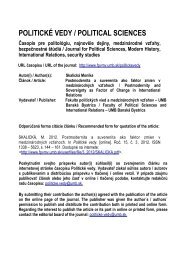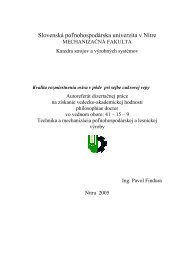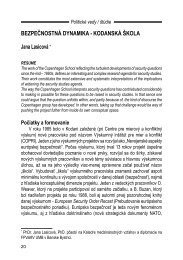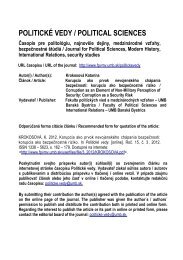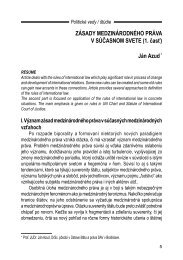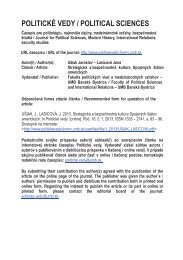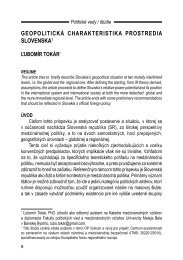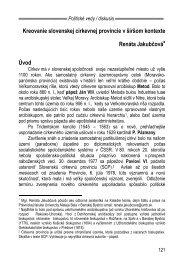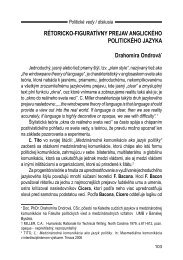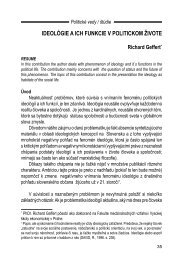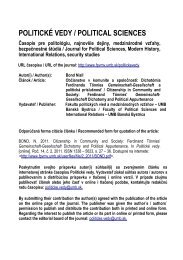MRAVNÃ VÃCHOVA V Å KOLÃCH NA SLOVENSKU A V ZAHRANI ÄÃ
MRAVNÃ VÃCHOVA V Å KOLÃCH NA SLOVENSKU A V ZAHRANI ÄÃ
MRAVNÃ VÃCHOVA V Å KOLÃCH NA SLOVENSKU A V ZAHRANI ÄÃ
You also want an ePaper? Increase the reach of your titles
YUMPU automatically turns print PDFs into web optimized ePapers that Google loves.
epresentation, literary work, film, photo, happening) (10–12), becoming acquainted with and<br />
interviewing experts (10–12), research (a) collecting, arranging and analysing data, biological,<br />
psychological and sociological facts, (b) experiments (c) preparing psychography and sociography in<br />
the language of literature and films (10–12) 1 .<br />
5. Teaching aids for Anthropolgy and ethics<br />
Among a dozen of curricula the curriculum elaborated for the Zsolnai-schools is considered to be one<br />
of the best. One of them is specialises in social science, another in religious knowledge, another in<br />
self-knowledge, and one has a Christian approach.<br />
Among the textbooks there is only one that suits the requirements of the NCC, and this is the textbook<br />
of István Kamarás and Klára Vörös, entitled Learning about man. "At the end of the 20 th century, on a<br />
sunny September 1 st strange creatures arrived from the planet of Alpha-beta-gamma. The ABC-123<br />
satellite exchange sent them to the Earth with the mission of discovering the most developed creature<br />
on Earth." These are the opening sentences of the workbook-like textbook, which makes students<br />
discover human as a biological, feeling, thinking, appraising, social, moral and spiritual being. The<br />
series entitled Mental Hygiene is, in spite of its minor deficiencies (differences in level, not always<br />
imaginative and inspiring tasks, and apparently accidental combination of various subjects) after all a<br />
decent work (Zsíros, 1991; Polinger, Zsíros). An interesting attempt is the textbook Ethics prepared by<br />
the members of the alternative Catholic Bokor movement mainly for religious students. Apart from<br />
these a dozen of textbooks of self-knowledge, social studies and ethics (Jakab, Lányi, 2001) can be<br />
used well for teaching Learning about man.<br />
Half a dozen of methodological guides (Lénártné, 1993), exercises (Szőcs, 1997; Ambrus, Kéri, 1996),<br />
and anthologies have been prepared, and a dozen of teacher's handbooks also help in teaching<br />
Learning about man (Falus, Jakab, 1999; Sallai, Szekszárdi, Jakab; 1999, Szőcs 1997) .<br />
6. The fate of Anthropology and Ethics from the late 90s up to<br />
this day 2<br />
The title of the essay on history of our new subject might be not else than Anthropology and Ethics in<br />
maze. We can say: in principle yes, in practice barely. In the late 90s the overwhelming majority of<br />
teachers agreed that considering knowledge of man our educational deficit is significant. They also<br />
agreed that something must be done urgently in this matter, and that a version of Learning about man<br />
included in the NCC seems to be a good solution. Yet, when it was time to carry plans out I<br />
experienced partly stubborn resistance, partly helplessness: who should teach it, from where and who<br />
should classes be taken away, these were the questions of directors mainly. Strangely dual (schizoid),<br />
in-principle-yes-in-practice-no attitude arose, and the balance was turned to 'no' in most cases.<br />
In the meantime 700 teachers participated in the 30-60 hour Learning about man or Anthropology and<br />
ethics courses of the county pedagogical institutes, local governments and pedagogical programs, In<br />
1997-98 there were about 1000 admirers of Learning about man, but most of them was unable to<br />
haggle successfully with the colleagues and/or directors over getting minimum one hour per week in at<br />
least two years.<br />
No doubt, the overall picture can be interpreted so that most schools do not require Learning about<br />
man or Anthropology and Ethics because a) they are reserved from anything new, b) they consider it a<br />
too difficult task, c) they do not want to upset the timetables, d) on ideological basis they cannot<br />
identify with the NCC of the previous government, e) because neither man, nor morals are suitable for<br />
their pragmatist and utilitarian values. However, it is only a part, and maybe the smaller part of the<br />
truth. The fact is that at least 500, but maybe even 1000 schools seriously (or somewhat seriously)<br />
undertook teaching the new subject.<br />
1 The best book of methodolgy of teaching of Anthropology and Ethics edited by Tivadar Homor, teacher of<br />
methodology in Pannon University (Homor,<br />
2 About the deatiled history of the new subject You can read: Géczi, Kamarás, 2007.<br />
114



